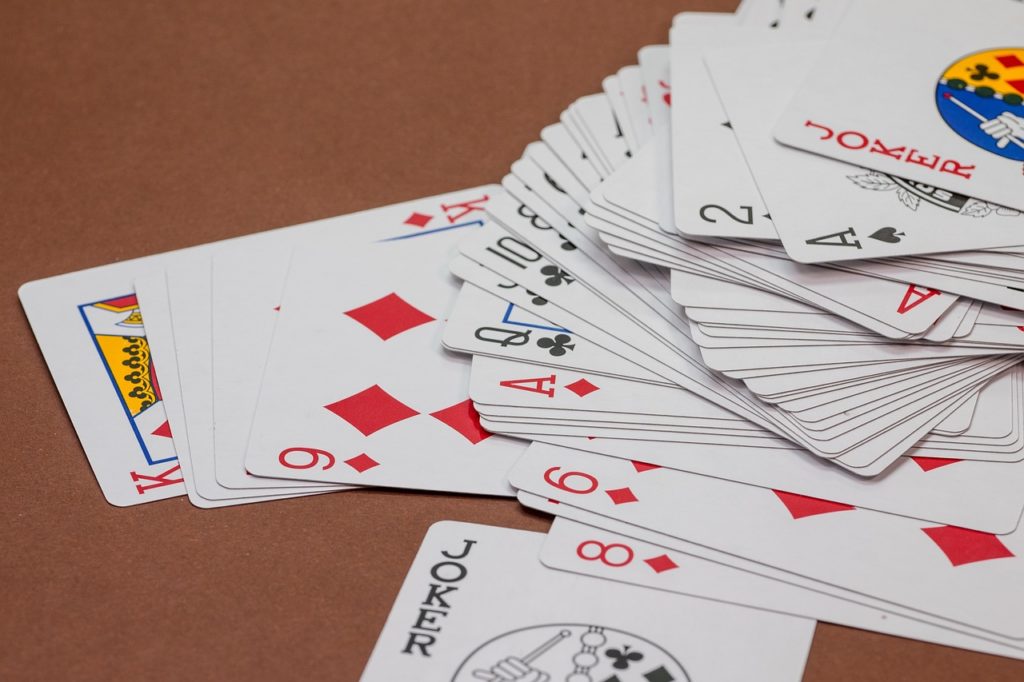The Magic of Card Games for Kids
Card games have a special place in the world of kids’ games. They not only provide entertainment but also offer numerous benefits for children of all ages. From building social skills to enhancing cognitive abilities, card games are a fantastic way to engage kids in a fun and educational activity. In this section, we will explore the benefits of playing card games and discuss the importance of age-appropriate card games.

Benefits of Playing Card Games
Playing card games offers a wide range of benefits for kids. Here are a few reasons why card games should be included in your child’s playtime:
- Cognitive Development: Card games help improve critical thinking, memory, and concentration skills. Kids learn to strategize, plan, and make decisions based on the cards they have.
- Math Skills: Many card games involve counting, adding, and comparing numbers. Playing these games can enhance a child’s mathematical abilities in a fun and interactive way.
- Social Interaction: Card games provide an opportunity for kids to interact with their peers, siblings, or parents. They learn essential social skills such as taking turns, following rules, and practicing good sportsmanship.
- Communication Skills: Card games often involve verbal communication, where kids need to express their thoughts, ask questions, and engage in conversation with others.
- Entertainment and Relaxation: Card games offer a break from screen time and provide a chance for kids to enjoy quality time with family and friends. They can be a source of relaxation and enjoyment for both kids and adults.
Age-Appropriate Card Games
It’s crucial to choose card games that are suitable for your child’s age and developmental stage. Here are some age-appropriate card games for kids:
| Age Group | Card Games |
|---|---|
| Preschoolers (3-5 years) | Go Fish, Old Maid, War |
| School-age Kids (6-12 years) | Crazy Eights, Spoons, Rummy |
| Teens (13+ years) | Hearts, Euchre, Poker |
These card games are just a few examples of the wide variety available for different age groups. Remember to consider your child’s interests and abilities when selecting a game. For more game ideas and recommendations, be sure to explore our other articles on fun kids games.
By introducing your child to card games, you can create lasting memories, foster important skills, and enjoy quality time together. Whether you’re playing card games for kids at home, during a family gathering, or on a rainy day, the magic of card games will surely captivate both you and your child.
Simple Card Games for Young Kids
Introducing young kids to the world of card games can be a fun and educational experience. Simple card games not only provide entertainment but also help develop important skills such as memory, counting, and taking turns. In this section, we will explore three popular card games that are perfect for young kids: Go Fish, Old Maid, and War.
Go Fish
Go Fish is a classic card game that is easy to learn and perfect for young children. The objective of the game is to collect sets of four cards of the same rank. The game starts with each player being dealt a hand of cards. The players take turns asking each other if they have a particular rank of card. If the player being asked has the requested card, they must give it to the asking player. If not, they say “Go Fish,” and the asking player draws a card from the deck. The game continues until all the sets of four are completed. The player with the most sets at the end of the game wins.
Old Maid
Old Maid is another simple and enjoyable card game for young kids. The game is played with a deck of cards, with one card being designated as the “Old Maid” card. The objective is to avoid being left with the Old Maid card at the end of the game. The cards are shuffled and then distributed among the players. Players take turns drawing a card from the player next to them, trying to make pairs and discard them. The player left with the Old Maid card is considered the loser. This game not only teaches kids about matching pairs but also adds an element of excitement as they try to avoid the dreaded Old Maid card.
War
War is a straightforward and fast-paced card game that can be enjoyed by young kids. The objective is to collect all the cards in the deck. The deck is divided equally among the players, and each player places their top card face-up in front of them. The player with the highest-ranking card takes all the cards from that round and adds them to their own pile. In case of a tie, a “war” occurs. Each player places three cards face-down and then another card face-up. The player with the highest-ranking face-up card wins the war and collects all the cards. The game continues until one player has all the cards. War is a great game to teach kids about number values and comparison.
By introducing young kids to simple card games like Go Fish, Old Maid, and War, parents can provide them with enjoyable and educational playtime. These games help children develop essential skills while having fun. Remember to create a positive and engaging environment, explaining the rules clearly and encouraging good sportsmanship. For more fun and educational game ideas, check out our articles on cooking games for kids, party games for kids, and board games for kids.
Engaging Card Games for Older Kids
As kids grow older, their interest in card games tends to evolve. Engaging card games for older kids offer more complexity and strategic thinking opportunities. Here are three must-try card games that are sure to captivate their attention: Crazy Eights, Spoons, and Rummy.
Crazy Eights
Crazy Eights is a fast-paced and exciting card game that is perfect for older kids. The objective of the game is to get rid of all your cards by matching the rank or suit of the previous card played. The game gets its name from the “eight” card, which serves as a wild card and can be played at any time. This adds an element of unpredictability and strategic decision-making to the game.
To play Crazy Eights, each player is dealt a hand of cards, and the remaining cards are placed face-down to form a draw pile. The top card of the draw pile is turned face-up to start the discard pile. Players take turns playing a card that matches the rank or suit of the top card on the discard pile. If a player cannot play a card, they must draw from the draw pile. The first player to get rid of all their cards wins.
Spoons
Spoons is a fast and lively card game that requires quick reflexes and observation skills. The objective of the game is to be the first player to collect a set of four cards of the same rank and grab a spoon from the center of the table. The catch is that there is one less spoon than the number of players, so the competition can get intense!
To play Spoons, a deck of cards is shuffled and each player is dealt four cards. The remaining cards are placed face-down in the center of the table, and the spoons are placed within reach of all players. The dealer starts the game by drawing a card from the deck and discarding one card face-down. The players pass cards around the table in a clockwise direction, trying to collect a set of four cards of the same rank. Once a player collects a set, they discreetly grab a spoon from the center. The other players must quickly follow suit. The player left without a spoon receives a letter in the word “SPOONS.” The first player to spell out the entire word is eliminated from the game.
Rummy
Rummy is a classic card game that is popular among both kids and adults. The objective of the game is to form sets or runs of cards and be the first player to get rid of all the cards in their hand. Rummy requires strategic thinking, memory skills, and a keen eye for patterns.
To play Rummy, a standard deck of cards is used. Each player is dealt a hand of cards, and the remaining cards are placed face-down to form a draw pile. The top card of the draw pile is turned face-up to start the discard pile. Players take turns either drawing a card from the draw pile or picking up the top card from the discard pile. The goal is to form sets (three or four cards of the same rank) or runs (three or more consecutive cards of the same suit). Once a player has formed a set or run, they can lay it down on the table. The game continues until one player gets rid of all their cards.
By introducing engaging card games like Crazy Eights, Spoons, and Rummy, you can provide older kids with hours of entertainment and mental stimulation. Encourage them to explore these games and discover the joy of strategic thinking and friendly competition. For more exciting game ideas, check out our articles on fun kids games.
Strategic Card Games for Teens
As kids grow older, their gaming preferences often evolve, and they may be ready for more complex and strategic card games. These games not only provide entertainment but also challenge their critical thinking and decision-making skills. Here are three strategic card games that are popular among teens:
Hearts
Hearts is a trick-taking game that requires both strategy and careful planning. The objective of the game is to avoid taking certain cards, particularly the hearts suit and the Queen of Spades. Players must try to “shoot the moon” by taking all the hearts and the Queen of Spades to inflict a high score on their opponents. However, this risky move can backfire if other players manage to avoid these cards.
Hearts is typically played with four players, and each round involves passing cards to other players to strategically manipulate the game. It’s a game that requires paying attention to the cards played by others and making calculated decisions based on the information available.
Euchre
Euchre is a fast-paced and exciting trick-taking game that originated in Europe. It is typically played with four players divided into two teams. The game uses a deck of 24 cards, consisting of the Ace, King, Queen, Jack, 10, and 9 cards for each suit.
Euchre involves bidding and winning tricks to accumulate points. The trump suit is determined through bidding, and players must strategize to win the majority of tricks needed to score points. The game becomes even more challenging with the inclusion of a special card called the Right Bower, which is the highest-ranking card in the trump suit.
With its combination of strategy, teamwork, and quick thinking, Euchre offers an engaging card game experience for teens.
Poker
Poker is a widely popular card game that encompasses various variations, such as Texas Hold’em, Omaha, and Seven Card Stud. It is a game of skill, strategy, and psychological analysis. While poker may involve an element of luck, successful players rely on their decision-making abilities and understanding of probabilities.
Poker is typically played with a standard deck of 52 cards and involves betting, bluffing, and trying to create the best hand possible. Players must assess their hand strength, read their opponents, and make calculated moves based on the information available.
Due to its strategic nature, poker is often played competitively and requires a good understanding of the game rules and different strategies. It can be an exciting and challenging card game for teens who enjoy strategic thinking and analyzing their opponents.
Introducing strategic card games like Hearts, Euchre, and Poker to teens can provide them with an enjoyable and intellectually stimulating gaming experience. Remember to always encourage fair play, teach them the rules, and create a positive gaming environment. If you’re looking for more game ideas for kids of all ages, check out our articles on board games for kids and fun kids games.
Tips for Introducing Card Games to Kids
Introducing card games to kids can be a fun and rewarding experience for both parents and children. It provides an opportunity for quality family time and helps develop various skills. Here are some essential tips to keep in mind when introducing card games to kids:
Teaching the Rules
When teaching card games to kids, it’s important to start with simple games that have easy-to-understand rules. Simplify the instructions and break them down into smaller steps to make it easier for kids to grasp the concepts. Use clear and concise language, ensuring that they understand the objective of the game and the basic rules involved.
Consider using visual aids, such as diagrams or illustrations, to help explain the rules visually. This can be particularly helpful for younger kids who may find it challenging to understand written or verbal instructions. As they become familiar with the game, gradually introduce new rules or variations to keep them engaged and interested.
Creating a Fun and Positive Environment
To make the card game experience enjoyable for kids, it’s important to create a fun and positive environment. Choose a comfortable and well-lit area where everyone can gather around the table. Create a welcoming atmosphere by playing some cheerful background music or providing snacks and drinks.
Encourage active participation and engagement by allowing kids to take turns, ask questions, and make decisions during the game. Celebrate their successes and provide gentle guidance and support when needed. Remember, the primary goal is to have fun and bond with your child while playing the game.
Encouraging Sportsmanship
Card games provide an excellent opportunity to teach kids about sportsmanship and fair play. Emphasize the importance of playing by the rules, taking turns, and respecting others. Encourage kids to congratulate and support each other, whether they win or lose.
Teach them how to handle disappointment and frustration gracefully. Remind them that winning is not the sole objective of playing games; it’s about enjoying the process and learning from the experience. By fostering a positive and respectful atmosphere during card games, you can instill valuable life skills that extend beyond the gaming table.
Introducing card games to kids can be an exciting and educational experience for both parents and children. By teaching the rules effectively, creating a fun and positive environment, and encouraging sportsmanship, you can help your child develop valuable skills and create lasting memories. Don’t forget to check out our other articles on fun kids games for more ideas to keep your little ones entertained!
Image by Michael Schwarzenberger from Pixabay






